Getting a 'namaskaram' in response to a 'namaste' is how Congress' Bharat yatris' experience in Kerala has been.

With hundreds of people joining in, Congress' Bharat Jodo Yatra continues to receive support in Kerala. (Anusha Ravi Sood/South First)
The Congress’ Bharat Jodo Yatra led by Rahul Gandhi clocked its first 100 kilometres in Kerala’s capital city Thiruvananthapuram on Monday, 13 September.
Only in its second leg now, the yatra has months before it concludes in Kashmir.
While all the attention is focused on Rahul Gandhi, nearly 120 more leaders and workers of the Congress are braving rains, sun, and blisters on their feet as they continue to walk.
On Monday, as the Bharat Jodo Yatra passed through Thiruvananthapuram city, Sarvan Kumar Gurjar — a Bharat Yatri from Rajasthan — fell behind.
His sprained left ankle — wrapped in a crepe bandage — and a bandaged blister on his right big toe were slowing him down.
“I will walk slowly, but I won’t stop. This is like penance for me, and I don’t want to abandon it,” Gurjar told South First.
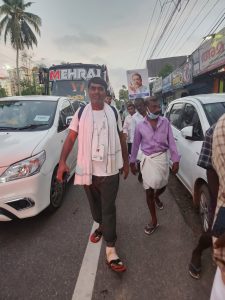
Sarvan Kumar Gurjar from Rajasthan walking in Bharat Jodo Yatra as a Bharat Yatri intends to cover the whole stretch. (Anusha Ravi Sood/South First)
“Swami Adi Shankaracharya traversed the country to bring people together. Mahatma Gandhi was from an affluent family, yet he led agitations in a loincloth. Lord Rama was a prince, and he still lived in the forest for 14 years. This pain is nothing,” Gurjar said, stopping for a short break.
When South First met him on Tuesday, he had chosen to put on a shoe. “Let’s see if this helps,” he said.
Having walked more than 130 kilometres by the end of the day on Tuesday, most yatris were experiencing injuries, blisters, and aches.
The Bharat Jodo Yatra has divided participants into three categories.
One is the Bharat Yatris, chosen by the Congress to travel with Rahul Gandhi through the entire stretch from Kanyakumari to Kashmir.
The second is atithi (guest) yatris, who are from different sections of society, joining the walk for shorter hauls.
The third is pradesh (regional) yatris, who are joining the walk in their respective regions — states or cities.
“Both my children — Sofia and Rehan — have Class 12 board exams this year, and I should have been there with them. However, I have chosen to be here and walk to Kashmir,” Noori Khan, one of the Bharat yatris, told South First.
“It is difficult, more so for women, to stay away from home for so long, but this is the only way to save our country,” said Khan, who is also a member of the Mahila Congress in Ujjain in Madhya Pradesh.
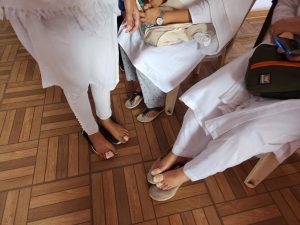
Bharat Jodo Yatra participants resting their injured feet during their afternoon break. (Anusha Ravi Sood/South First)
Khan, Shahla Irari from Uttar Pradesh, and Nanda Mhatre from Maharashtra were resting at a school in Thiruvananthapuram at the end of their morning walk on Monday.
Armed with olive oil to massage their aching legs and creams for blisters, the women chose to speak about how the yatra was helping them understand India better.
“We are getting a taste of India’s diverse culture as part of this Bharat Jodo Yatra: whether it is food or people or language,” said Sangeetha Kakria, another Bharat yatri.
She added that people in Kerala respond with “namaskaram” when she says “namaste”.
The Bharat yatris are living in modified containers that will be their homes for the next few months as they continue to walk.
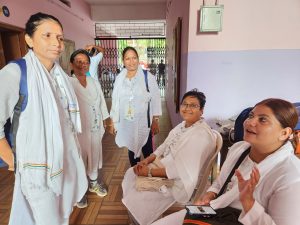
A group of women Bharat Yatris resting after their morning walk in Thiruvananthapuram on Monday. (Anusha Ravi Sood/South First)
“Think of it as a third AC train compartment. We share berths and a common toilet. Our district units take care of food at the camps we halt,” said Irari.
No such option is available for those not officially designated as Bharat yatris but are continuing to walk along, sleeping in the open, and making their own arrangements.
“We wake up at 4.45-5 am, get ready and finish breakfast by 5.45 am. We have a fall-in at 6 am. Every morning, we hoist the National Flag at 6.15 am, and start walking by 6.50 am,” said Irari.
Tucked in their small bags are sprain medications, bandages, massage oils, an umbrella for a rainy day, and water bottles.
The yatris, however, now wish they had undergone a short training for the walk, which could have helped them avoid injuries.
“We should, I think, also consider tying up with sponsors who can give our yatris good shoes to walk in,” said an All India Congress Committee (AICC) leader.
Every large-scale political event disrupts everyday life, and the route through which the Bharat Jodo yatra is passing is no different.
Passing through cities, especially, is a challenge for not just the yatra but also the local administration and residents.
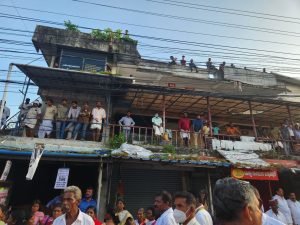
People line up on roads, atop buildings and balconies to get a glimpse of the Bharat Jodo Yatra in Thiruvananthapuram. (Anusha Ravi Sood/South First)
With people lining the route — outside homes, atop balconies and terraces, and even on footbridges — rush hour traffic has been no less than a nightmare for the police.
As surging crowds forced the police to block traffic, several ambulances worked their way through crowded streets, compelled to slow down.
Citizens and commuters arguing with traffic policemen over extended blockades of traffic as the yatra passed by was a common sight in Thiruvananthapuram on Monday.
As the yatra resumed on national highways, management became smoother.
For party workers, however, it was jubilation. Dozens of them, waving Congress flags and coming up with innovative slogans, were seen inviting yatris to sip a cup of tea — at their expense.
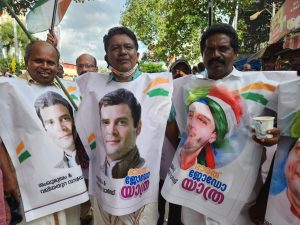
Members of Kerala Congress’ Thiruvananthapuram beach mandalam pose with Rahul Gandhi flex banners fashioned into a cape. (Anusha Ravi Sood/South First)
“We are paying for the yatris to have tea. This is our small contribution and hospitality for those walking with our leaders,” Dr J Moses, a member of the District Congress Committee in Thiruvananthapuram, told South First.
Moses, along with a host of his Beach Mandalam Congress unit, had flex banners with Rahul Gandhi’s photo fashioned into a poncho.
The beach mandalam unit, largely consisting of fishermen, raised concerns over sea erosion, fish workers’ problems, and the Adani port during their interactions with Rahul Gandhi.
Suresh Daniel, a Congress worker from Adoor, has a hip injury. However, that hasn’t stopped him from not just arriving in Thiruvananthapuram for the Bharat Jodo Yatra but bringing along 100 people from his village.
“We have hired two tourist buses — all at our own expense — to take part in this yatra. We have come all the way to Thiruvananthapuram because the yatra route doesn’t cover our village,” Daniel told South First.

May 07, 2024

May 07, 2024

May 07, 2024

May 07, 2024

May 07, 2024

May 07, 2024